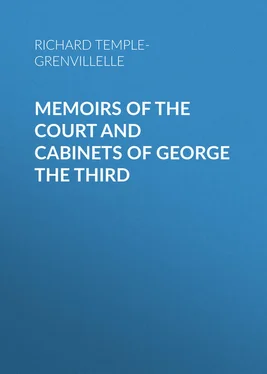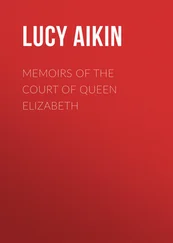Richard Buckingham and Chandos - Memoirs of the Court and Cabinets of George the Third
Здесь есть возможность читать онлайн «Richard Buckingham and Chandos - Memoirs of the Court and Cabinets of George the Third» — ознакомительный отрывок электронной книги совершенно бесплатно, а после прочтения отрывка купить полную версию. В некоторых случаях можно слушать аудио, скачать через торрент в формате fb2 и присутствует краткое содержание. Жанр: foreign_antique, foreign_prose, на английском языке. Описание произведения, (предисловие) а так же отзывы посетителей доступны на портале библиотеки ЛибКат.
- Название:Memoirs of the Court and Cabinets of George the Third
- Автор:
- Жанр:
- Год:неизвестен
- ISBN:нет данных
- Рейтинг книги:5 / 5. Голосов: 1
-
Избранное:Добавить в избранное
- Отзывы:
-
Ваша оценка:
- 100
- 1
- 2
- 3
- 4
- 5
Memoirs of the Court and Cabinets of George the Third: краткое содержание, описание и аннотация
Предлагаем к чтению аннотацию, описание, краткое содержание или предисловие (зависит от того, что написал сам автор книги «Memoirs of the Court and Cabinets of George the Third»). Если вы не нашли необходимую информацию о книге — напишите в комментариях, мы постараемся отыскать её.
Memoirs of the Court and Cabinets of George the Third — читать онлайн ознакомительный отрывок
Ниже представлен текст книги, разбитый по страницам. Система сохранения места последней прочитанной страницы, позволяет с удобством читать онлайн бесплатно книгу «Memoirs of the Court and Cabinets of George the Third», без необходимости каждый раз заново искать на чём Вы остановились. Поставьте закладку, и сможете в любой момент перейти на страницу, на которой закончили чтение.
Интервал:
Закладка:
I send you a note which Wilberforce put into my hands. If the thing cannot be done, pray send a separate and very civil letter about it; because this Sir J. Coghill is one of his chief friends in Yorkshire, and he particularly desires to be able to send him a civil answer.
Ever most affectionately yours,
W. W. G.
The next day, immediately after this favourable report from a physician whose experience in this particular branch of practice gave great weight to his opinions, Thurlow began to veer round again to the Ministry. "Whatever object he might at one time have had in view," says Mr. Grenville, "he has now taken his determination of abiding by the present Government." Thurlow, in short, was exactly the man the King believed him to be, and always kept in the sun.
MR. W. W. GRENVILLE TO THE MARQUIS OF BUCKINGHAM.
Whitehall, Dec. 7th, 1788.
My dear Brother,
There is nothing particularly worth mentioning to you with respect to Willis, more than what I told you in my last letter. He expressed himself very strongly to Pitt as to his hopes of the King's recovery, and said that there was no symptom which he saw in him, or could learn from the other physicians, which he had not seen much stronger in other people who have recovered. He has, I understand, already acquired a complete ascendancy over him, which is the point for which he is particularly famous. He had the boldness yesterday to suffer the King to shave himself in his presence. The King was much more composed than he has ever been, slept uncommonly well the night before last; said in the morning that he found himself much better, for that Dr. Willis had settled his mind; and was remarkably quiet the whole of yesterday. The account this morning is also, I understand, very favourable. I have just seen a man who saw a note of Willis's dated late last night, in which he says that he is confident the King would do very well. He is to continue entirely with him, and to have the complete management of him. The other physicians are, however, to see him, in order to keep him in bodily health.
It is quite ridiculous to see how angry the Opposition are at the report of the physicians, and particularly at what Warren said, which, I understand, was very different from what they had expected. They go so far as to say, that if Fox had been present he would not have dared to give such an evidence. They hope to mend it by a subsequent examination before a Committee of the House: the object of Willis being examined is so great, that I think we shall consent to something of this sort. Not only his opinion will have great weight, but it will also make the others very cautious what they say in opposition to it.
The behaviour of the two Princes is such as to shock every man's feelings. What do you think of the Duke of York's having a meeting of the Opposition at his house on Thursday, before the House of Lords met, and then going down there to hear the examinations read? After that, they closed the day, by both going in the evening to Brooks's. The truth is, that the Duke is entirely in his brother's hands, and that the latter is taking inconceivable pains to keep him so, in order that he may not see what a line is open to him if he had judgment to follow it.
The assurances of support which Pitt receives from all quarters are much beyond the expectations which we had formed. It is also clear that, whatever object Thurlow might at one time have had in view, he has now taken his determination of abiding by the present Government, and supporting their measures with respect to the Regency. I imagine that Lord Stafford and Lord Weymouth have chiefly influenced his resolution – their line having been clear and decided from the beginning.
On the other hand, there seems great reason to believe that the Prince of Wales is inclined to go to all the lengths to which that party are pushing him. They have for several days been spreading a report that he has expressed a determination not to accept of the Regency under any restrictions or in any manner at all short of regal power; and that the Duke of York was commissioned by him to have declared this on Thursday, if anything had been said that could at all have led to it. The story of to-day is, that the three Royal Dukes have assured him of their resolution to refuse it if tendered to them on similar terms, and that they have authorized Fox to say this in the House of Commons. There is no knowing what sort of effect this may produce with respect to the measures of the present moment: that must depend entirely on the sort of turn that the people in general may take upon it at first. But it is very evident that by such a step the Prince will do himself a permanent mischief which he will never be able to repair, and which we shall probably all of us have much reason to regret. It is quite clear that, having once proposed these restrictions, as thinking them necessary for the interest of the King (and on that ground only could we propose them), no other motive whatever can be a justification for abandoning them, as long as there can be found one individual or set of individuals who will undertake to carry on the Government, and as long as Parliament continues to think the proposal right and equitable. What all this may produce, God only knows. Our reliance can only be on the discharge of what we owe to the King in gratitude and duty, and in the decided manner in which we have put all considerations out of the question which can personally affect our own interests.
In the midst of all this confusion, and while his sons and brothers are struggling to gain entire possession of his authority, the King may recover his reason. What a scene will present itself to him! and how devoutly must he pray, if he is wise, to lose again all power of recollection or reflection.
The struggle was now beginning in earnest between the Ministers and the Prince of Wales. The point at issue apparently narrowed itself to the restrictions; but there lay beneath this question of royal expediency a great constitutional principle, which was gradually developed in the progress of the subsequent debates. It was not alone that Mr. Fox and his party demanded the Regency without any limitations whatever, but that they demanded it as a right; setting up the doctrine that when the Sovereign, from any cause, became incapacitated, the Heir Apparent had an indisputable claim to the executive authority during the continuance of the incapacity, just as he would have on the demise of the Crown. It was strange enough that this doctrine, which Mr. Pitt denounced as "treason against the Constitution," should have been maintained by the avowed champions of popular liberty; and that it should have been reserved for the Ministers of the King to defend the interests of the people against the encroachments of royalty. Mr. Pitt asserted that the right of providing a remedy for the suspension of the regular powers of Government rested solely with the people, "from whom," he added, "all the powers of Government originate." The language he held upon this occasion is remarkable not only from its constitutional soundness, but for the perspicuity with which it states the actual question in contest, stripped of all disguises and evasions. "To assert an inherent right in the Prince of Wales to assume the Government, is virtually to revive those exploded ideas of the divine and indefeasible authority of Princes, which have so justly sunk into contempt and almost oblivion. Kings and Princes derive their power from the people; and to the people alone, through the organ of their representatives, does it appertain to decide in cases for which the Constitution has made no specific or positive provision." It will be seen that in the end the Prince of Wales was obliged to abandon his claim of right, and that the steadfastness of Pitt finally secured the recognition of the principle which placed in the hands of Parliament the settlement of the conditions under which His Royal Highness was to enter upon the Regency.
Читать дальшеИнтервал:
Закладка:
Похожие книги на «Memoirs of the Court and Cabinets of George the Third»
Представляем Вашему вниманию похожие книги на «Memoirs of the Court and Cabinets of George the Third» списком для выбора. Мы отобрали схожую по названию и смыслу литературу в надежде предоставить читателям больше вариантов отыскать новые, интересные, ещё непрочитанные произведения.
Обсуждение, отзывы о книге «Memoirs of the Court and Cabinets of George the Third» и просто собственные мнения читателей. Оставьте ваши комментарии, напишите, что Вы думаете о произведении, его смысле или главных героях. Укажите что конкретно понравилось, а что нет, и почему Вы так считаете.












